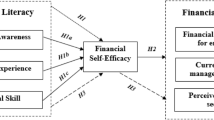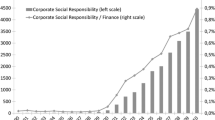Abstract
In this paper, we analyzed the results of our survey on Japanese stock investor’s asset risk management and empirically examined the effect of their investment literacy on their decision-making biases. This paper revealed that the higher the investors’ investment literacy, the lower their overconfidence bias. This suggests that high investment literacy can prevent investors from being influenced by an overconfidence bias and consequently making biased decisions in investment. Therefore, efforts to improve investors’ investment literacy by enhancing social systems such as investment education could be beneficial in guiding investors to make unbiased investment decisions.
Similar content being viewed by others
References
Yada K., Washio T., Ukai Y., Nagaoka H.: Modeling bank runs in financial crises. Review of Socionetwork Strategies 3(1), 19–31 (2009)
Takemura T., Kozu T.: Modeling Individuals’ Deposit-withdrawal behaviors after receiving information on financial turmoil. Research in Business and Economics Journal. 3, 58–74 (2010)
Takemura T., Kozu T.: Behavioral modeling in policy science. Journal of the Japanese Society for Artificial Intelligence. 26((2), 131–138 (2011)
Takemura T., Kozu T., Kobayashi T.: Modeling deposit-withdrawal behavior from the perspective of risk tolerance. RISS Discussion Paper Series. 5, 1–16 (2011)
Kozu T., Takemura T., Takeda K.: An attribute analysis of Internet survey on individual investors’ Stock investment decisions. RISS Discussion Paper Series. 17, 1–16 (2012)
Thaler R.H., Sunstein C.R.: Libertarian paternalism. American Economic Review. 93, 175–179 (2003)
Markowitz H.: Portfolio selection. Journal of Finance. 7, 77–91 (1952)
Modigliani F., Miller M.H.: The cost of capital, corporation finance and the theory of investment. American Economic Review. 48, 261–297 (1958)
Sharpe W.: Capital asset prices: atheory of market equilibrium under conditions of risk. Journal of Finance. 19, 425–442 (1964)
Merton R.C.: Theory of rational option pricing. Bell Journal of Economics and Management Science. 4, 141–183 (1973)
Black F., Scholes M.: The pricing of options and corporate liabilities. Journal of Political Economy. 81, 637–654 (1973)
Friedman, M.: Essays in positive economics. London: University of Chicago Press, 1953
Kahneman D., Tversky A.: Prospect theory: an analysis of decision under risk. Econometrica. 47, 263–291 (1979)
Lichtenstein, S., B. Fischhoff and L. D. Phillips: Calibration of probabilities: the state of the art to 1980 in D. Kahneman, P. Slovic and A. Tversky. Judgement under uncertainty, Cambridge University Press, 306-334, 1982
Harvey H.: Confidence in judgment. Trends in Cognitive Sciences. 1, 78–82 (1997)
Skala D.: Overconfidence in psychology and finance - an interdisciplinary literature review. Bank i Kredyt. 39(4), 33–50 (2008)
Odean T.: Do investors trade too much? American Economic Review.. 89, 1279–1298 (1999)
Jegadeesh N., Titman S.: Returns to buying winners and selling losers: implications for stock market efficiency. Journal of Finance. 48, 65–91 (1993)
Jegadeesh N., Titman S.: Profitability of momentum strategies: an evaluation of alternative explanations. Journal of Finance. 56, 699–720 (2001)
De Bondt W.F.M., Thaler R.H.: Does the stock market overreact? Journal of Finance.. 40, 793–808 (1985)
Hong H., Kubik J.D., Stein J.C.: Thy neighbor’s portfolio: word-of-mouth effects in the holdings and trades of money managers. Journal of Finance. 60, 2801–2824 (2005)
Ivkovic Z., Weisbenner S.: Information diffusion effects in individual investors common stock purchases: covet thy neighbors’ investment choices. Review of Financial Studies. 20, 1327–1357 (2007)
Dhar R., Zhu N.: Up close and personal: investor sophistication and the disposition effect. Management Science. 52, 726–740 (2006)
Hastings J. S., Tejeda-Ashton L.: Financial literacy information and demand elasticity: survey and experimental evidence from Mexico. NBER Working Paper. 14538, 1–34 (2008)
Menkhoff L., Schmidt U., Brozynski T.: The impact of experience on risk taking, overconfidence, and heading of fund managers: complementary survey evidence. European Economic Review. 50, 1753–1766 (2006)
DeLong J. B., Shleifer A., Summers L. H., Waldmann R. J.: Noise trader risk in financial markets. Journal of Political Economy. 98, 703–738 (1990)
Berg N., Eckel C., Johnson C.: Inconsistency pays?: Time-inconsistent subjects and EU violators earn more. University of Texas-Dallas, Working Paper (2010)
Shiv B., Loewenstein G., Bechara A.: The dark side of emotion in decision-making: When individuals with decreased emotional reactions make more advantageous decisions. Cognitive Brain Research. 23, 85–92 (2005)
Zak P., Knack S.: Trust and growth. Economic Journal. 111, 295–321 (2001)
Author information
Authors and Affiliations
Corresponding author
Rights and permissions
About this article
Cite this article
Takeda, K., Takemura, T. & Kozu, T. Investment Literacy and Individual Investor Biases: Survey Evidence in the Japanese Stock Market. Rev Socionetwork Strat 7, 31–42 (2013). https://doi.org/10.1007/s12626-012-0031-z
Received:
Accepted:
Published:
Issue Date:
DOI: https://doi.org/10.1007/s12626-012-0031-z




